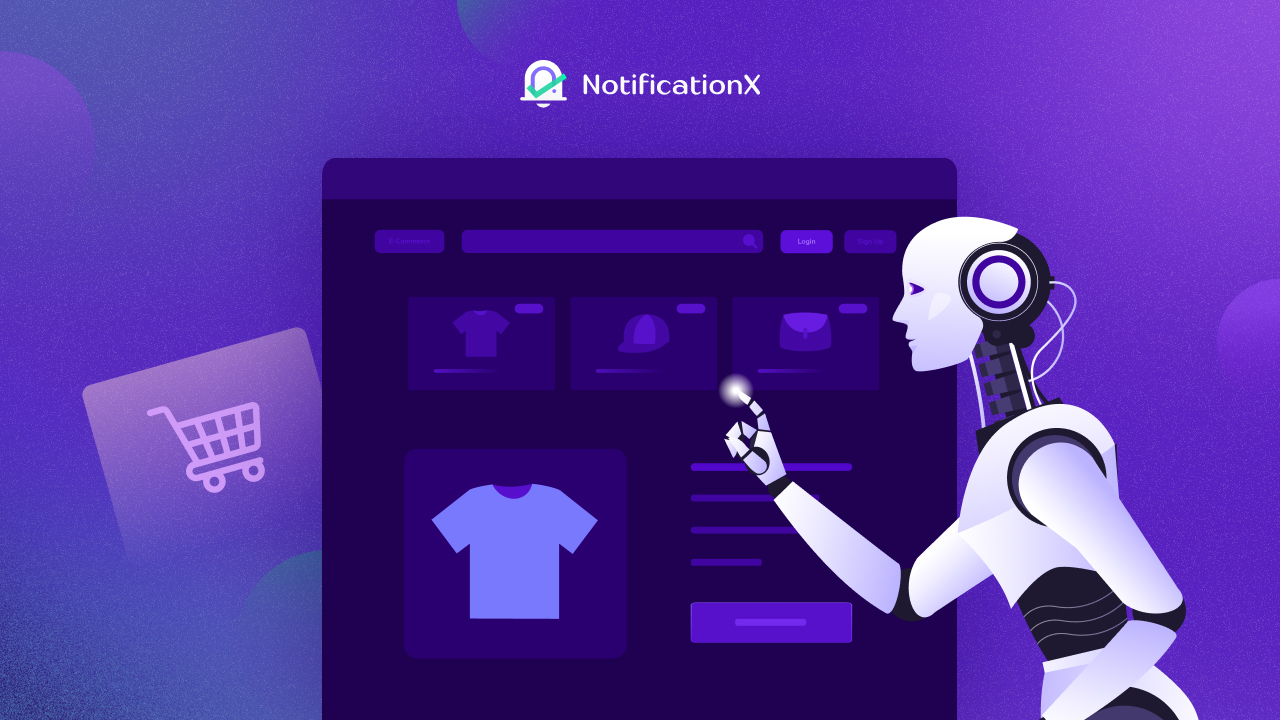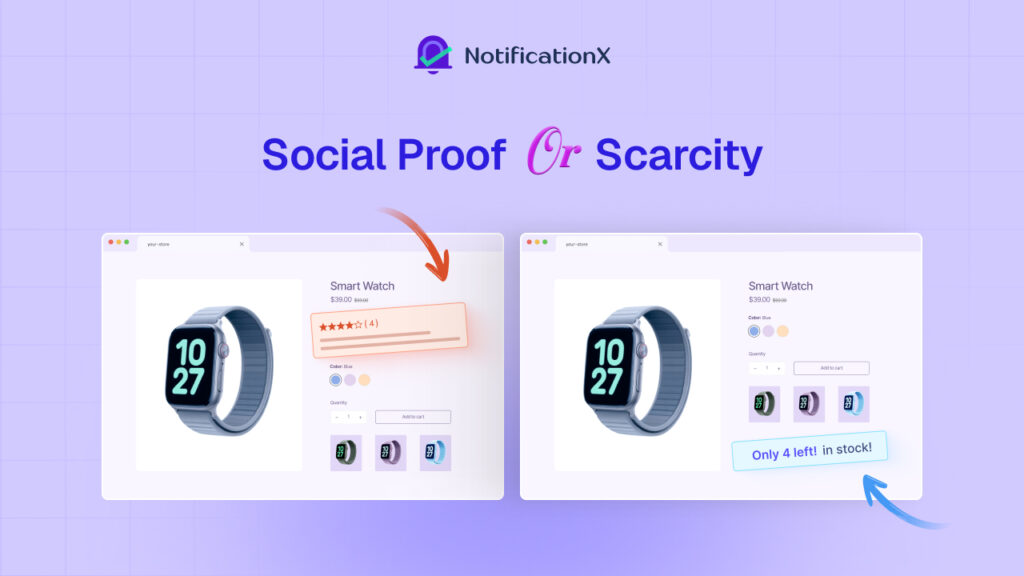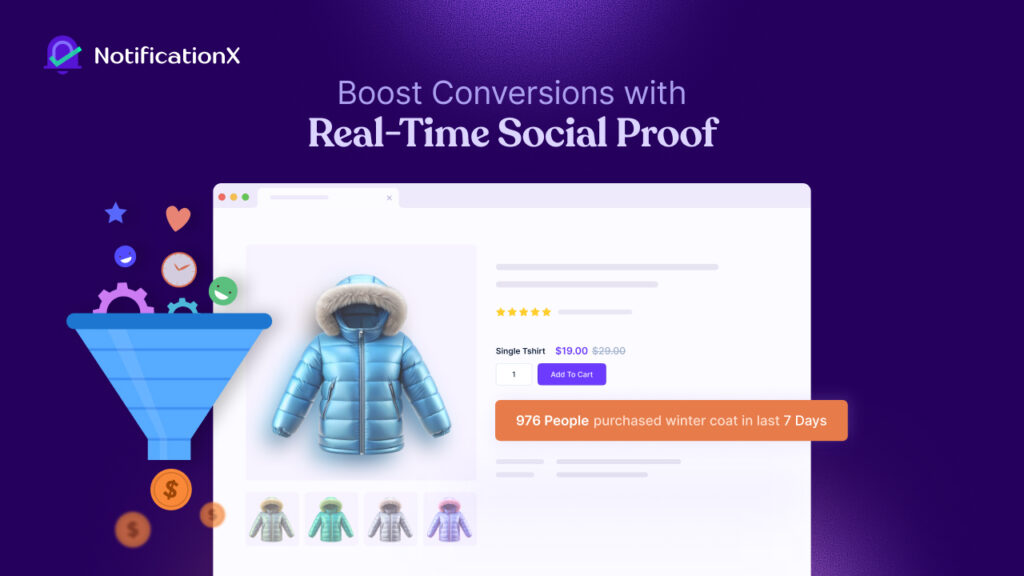Unless you are not living on a deserted island, you may have encountered the buzzword "AI in eCommerce.’ Gone are the days when artificial intelligence (AI) was only confined to science fiction. With that said, eCommerce business owners are now implying several bold ways to use AI in eCommerce. Based on the AI Business report, by 2025 AI is expected to power 95% of customer interactions. This is how impactful eCommerce robots have become.

💡What Are the Benefits of Using AI in eCommerce?
AI is revolutionizing the online retail industry, whether it is customer targeting, reducing human error, team productivity, or saving time and money. Here are a few prominent advantages below that you can get while using AI in eCommerce:
✅ Precise Targeting: AI helps understand customer data better, spot trends, influencers, and upcoming social media buzz.
✅ Error Reduction: AI-powered systems in order fulfillment boast a 99% accuracy rate, minimizing mistakes.
✅ Boosted Productivity: AI tackles repetitive tasks, freeing up time for employees to focus on more important work, increasing productivity by up to 14%.
✅ Cost Savings: By streamlining operations, AI saves companies significant money—some report savings ranging from $50,000 to $100,000 or more.
🚀 10 Best Practices of Using AI in eCommerce to Save Time & Foster Productivity

To save time and boost productivity, there are a bunch of ways you can use AI in your eCommerce business. From understanding customer sentiments, personalizing the shopping experience for each customer to investing in AI, all you need to know is how to implement these in your eCommerce business. Let us dive in.
1. Personalizing the Shopping Experience for Each Customer
Utilizing AI to personalize recommendations based on a customer’s shopping and browsing history can revolutionize how businesses operate, making them more efficient and profitable.
By offering customized product suggestions, companies can meet the specific needs of their customers, leading to higher satisfaction and loyalty. This strategy allows large online retailers to precisely target their audience, increasing sales and contributing to broader economic progress.
For example, imagine an online clothing retailer that uses AI to analyze a customer’s shopping and browsing history. When a customer frequently browses summer dresses and sandals, the AI system recommends new arrivals and exclusive offers on similar items.
This personalized shopping experience not only meets the customer’s specific needs, enhancing their satisfaction and loyalty but also boosts the retailer’s sales. By efficiently targeting the right products to the right customers using AI in eCommerce, the retailer can increase its profitability.
2. Answering Customer Questions in Real Time Through Chatbots
Customers today expect quick and easy answers through technology like chatbots, instead of waiting on hold or dealing with complicated automated systems. AI chatbots are helpful for businesses because they save both time and money.
By using AI to handle customer questions, employees can focus on more important tasks. With AI-powered chatbots, businesses can make sure customers get accurate information quickly, leading to better overall satisfaction with customer service.
Let us assume, you are a customer service representative at a bustling tech company. With a constant stream of inquiries flooding in, you used to find yourself juggling multiple calls and emails simultaneously, often leaving customers on hold for what felt like an eternity. To solve this problem, your company implemented AI chatbots to handle routine queries.
Now, instead of being tied up with mundane questions, you can concentrate on resolving complex issues and providing personalized support. The AI chatbots swiftly handle basic inquiries, delivering quick and accurate responses to customers. This not only enhances customer satisfaction but also boosts your productivity, allowing you to tackle more meaningful tasks.
3. Providing Recommendations Based on Past Purchase & Search Intent
Using AI to offer personalized recommendations based on past purchases and search history helps businesses work more efficiently and make more money.
Many companies have had great success with this approach because it gives customers tailored product suggestions that match their specific needs. This allows big online stores to reach the right customers at the perfect time, boosting sales and driving economic growth.

Now let us imagine an online store where AI algorithms sift through vast amounts of data to offer personalized recommendations. You – an avid shopper searching for a perfect gift. As you browse, AI quietly observes your preferences, noting past purchases and search history.
Suddenly, your screen lights up with suggestions tailored just for you—a curated selection of items perfectly aligned with your tastes. Delighted, you add several to your cart, grateful for the convenience and precision of AI-driven recommendations.
Meanwhile, behind the scenes, the store celebrates another successful sale, a testament to the power of AI in enhancing customer experience and driving revenue.
4. Driving Data-led Decision-making and Market Research
As an eCommerce business owner, you need to set dynamic pricing for your products and services. This is why you need to do market research and make decisions based on the data you find. AI can be a great help in this data-led decision-making and market research. In a nutshell, AI can analyze factors like market demand, competition, and customer behavior to set prices, ultimately enhancing رضا العملاء.
Let us say, you are selling trendy gadgets using the eCommerce platform. To stay competitive, you regularly analyze market trends and adjust your prices accordingly. However, manually sifting through heaps of data can be overwhelming.
Here is where AI swoops in to save the day. By using AI, you can effortlessly sift through market demand, competitor pricing strategies, and customer behavior patterns. Armed with this insightful data, you can dynamically adjust your prices, ensuring optimal profitability while keeping your customers satisfied.
5. Analyzing Customer Sentiment & Feedback
In the eCommerce business, to understand customers’ real sentiments AI can play a vital part. No matter how small or big your business is, AI is a powerful tool that you can use for all sizes of businesses.
It helps analyze customer feedback to understand their needs and preferences. This insight enables companies to create better content, products, and services that align with customer expectations.

By using AI, businesses can quickly spot trends and problems, allowing for prompt responses. This analysis of customer sentiment helps companies make more informed decisions, improving overall customer satisfaction.
6. Automating Tasks to Save Time and Money
Using AI in eCommerce you can greatly boost your business’s efficiency by handling repetitive tasks. This saves time and reduces labor costs. A well-planned AI system can ease the workload in busy areas, giving you more time for other important activities.
Moreover, AI helps manage resources better and keeps budgets in check. Investing in automation can lead to significant savings and make your business more competitive.
However, handmade crafts are so popular in the eCommerce business nowadays- let us imagine you run an eCommerce store that sells these. With AI integration into your store, you can automate inventory management, order processing, and customer inquiries.
This frees up your time to focus on creating new designs and engaging with customers. Plus, AI optimizes resource allocation which ensures you do not overspend on materials or storage.
7. Improving the Entire Business Strategy
AI can make your eCommerce business operations smoother and more cost-effective by automating tasks like – data entry, customer service, supply chain management & more. With AI in eCommerce, you can make quicker and more informed decisions thanks to accurate data. It also enhances customer experience through personalized interactions. Ultimately, AI helps businesses achieve more in less time while reducing expenses.
8. Balancing Business Risk Management
Using AI in eCommerce, you can enhance risk management for your business. AI allows businesses to swiftly and accurately analyze vast data sets, spotting potential risks and opportunities.
With AI-powered systems, companies gain real-time insights into customer behaviors and preferences, helping them make better decisions. Additionally, AI helps protect data and assets by quickly detecting fraud and other security threats.
9. Detecting and Preventing Fraud
AI is becoming a key tool in fighting fraud. It helps organizations keep an eye on database activity and spot unusual patterns early. By processing large amounts of data fast, AI can detect anomalies, flag suspicious actions, and even predict fraud before it happens.
Using AI in eCommerce for fraud detection is also cost-effective. It reduces the need for human resources to monitor transactions and behaviors, allowing staff to focus on other tasks. This technology improves accuracy in spotting fraud and speeds up investigations of potential illegal activities.
10. Investing in AI for Security
Nowadays many companies are investing in AI to keep their business secure from any kind of threats. It could be an unusual behavior that may signal cyberattacks. Organizations can easily enhance their data and network security by leveraging AI-powered solutions.
These advanced tools help identify potential system vulnerabilities, allow for rapid response to threats, monitor user activities, spot unusual behaviors that may signal cyberattacks, and prevent fraud, ensuring the protection of sensitive information.
🎖️ Best 5 Recommended Tools That You Can Use in eCommerce
There are uncountable tools available nowadays that can increase your eCommerce business’s profitability and customer loyalty. Below is a list of 5 AI tools from us that can collectively help you enhance your eCommerce ecosystem. With these tools, you can make your work easier and smoother – improving customer interactions, personalizing experiences, optimizing operations, and providing actionable insights.
1. Chatbots (e.g., ChatGPT)
AI-powered chatbots can simulate human conversation and provide real-time assistance to customers. They can answer queries, provide product information, and help with order processing.

How can it benefit your business? 👇
- 24/7 Customer Support: Provides immediate responses, enhancing customer satisfaction.
- Personalized Assistance: Offers tailored product recommendations, improving shopping experience.
- Order Tracking: Assists customers in tracking their orders, reducing the burden on customer service teams.
2. Recommendation Engines (e.g., Amazon Personalize)
Tools like Amazon Personalize analyze customer behavior and preferences to suggest products that the customer is likely to be interested in, based on their browsing and purchase history.

What are the benefits? 👇
- Increased Sales: Drives higher conversion rates by suggesting relevant products.
- Enhanced User Experience: Makes it easier for customers to find products they like, improving satisfaction.
- Customer Retention: Encourages repeat purchases through personalized recommendations.
3. Visual Search Tools (e.g., Google Lens, Slyce)
AI tools like Google Lens, Slyce allow customers to search for products using images rather than text. Customers can take a photo or upload an image to find similar products available for purchase.

What are the advantages? 👇
- Improved Search Accuracy: Provides more accurate search results by using images.
- Enhanced Discoverability: Helps customers find products even if they do not know the exact name or description.
- Better Engagement: Engages customers through an innovative and interactive search experience.
4. Inventory Management Systems (e.g., TradeGecko, Zoho Inventory)

These systems use AI to manage stock levels, predict demand, and automate inventory processes, ensuring that the right amount of stock is always available.
How does it benefit you? 👇
- Optimized Stock Levels: Reduces overstock and stockouts by predicting demand accurately.
- Improved Efficiency: Automates tracking and management, saving time and reducing human error.
- Cost Savings: Minimizes storage and holding costs through optimal inventory levels.
5. Customer Analytics Platforms (e.g., Salesforce Einstein Analytics)
Customer analytics platforms like Salesforce Einstein Analytics provide insights into customer behavior, preferences, and trends, helping businesses make data-driven decisions.

What are the advantages? 👇
- Data-Driven Insights: Delivers deep insights into customer behavior and market trends.
- Personalized Marketing: Enables targeted marketing campaigns based on detailed customer profiles.
- Enhanced Decision-Making: Supports strategic decisions with predictive analytics and comprehensive customer data.
AI in eCommerce: The Key to Future-Proofing Your Business
The future is unfolding right before our eyes, and AI is revolutionizing eCommerce in remarkable ways. Getting on board with AI now puts you in the lead, leaving competitors trailing behind.
With a solid strategy and the right tools that mentioned above, AI in eCommerce can be a game-changer for your business. Dare to innovate and see how artificial intelligence can set your online store apart from the rest.
Do you think this blog is helpful? Do not forget to اشترك في مدونتنا to read more tutorials, tips and tricks. Or, you can also join our مجتمع Facebook حيث يمكنك التواصل مع جهات تسويق أخرى أيضًا.




